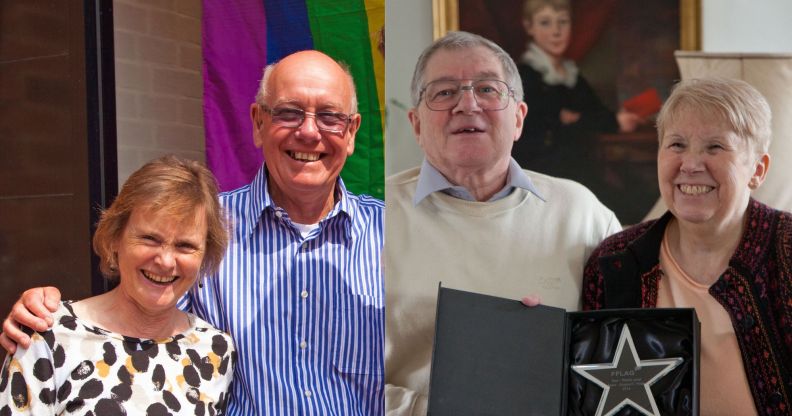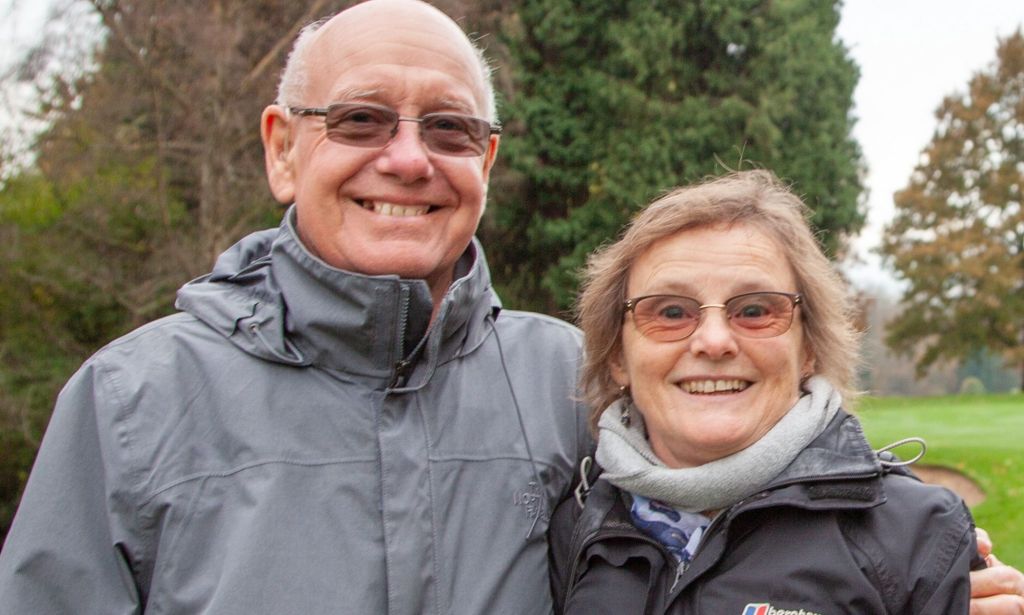How ‘fundamentalist religious’ parents formed an ‘extraordinary’ charity for families of LGBTQ+ kids

FFLAG group leaders Janet and Bruce Kent (L) and Sue and Bob Allen have worked to support countless families of LGBTQ+ youth through the charity. (Provided)
FFLAG group leaders Janet and Bruce Kent (L) and Sue and Bob Allen have worked to support countless families of LGBTQ+ youth through the charity. (Provided)
It takes a village of support for queer youth to thrive. And a parent learning that their child is trans can bring up all sorts of feelings like confusion and distress, even fearfulness.
Knowing how to support and advocate for a child when they’ve come out as LGBTQ+ can feel overwhelming.
Fortunately, the charity Families and Friends of Lesbians and Gays (FFLAG) have developed a network of supportive groups to help families find community in their journey to help their kids develop and flourish.
FFLAG group leaders Sue and Bob Allen, and Janet and Bruce Kent, have witnessed the national community of families supporting LGBTQ+ loved ones grow in the decades they’ve been working with the charity.
Janet explains how Sue and Allen Kent started Bristol Families and Friends, which eventually transformed into FFLAG Bristol, almost 26 years ago and how it helped her find a connection to other parents at a time when she was “really upset”.
“When we went along, I was in a place of conflict after our son had come out as gay 22 years ago, and we were coming from a fundamentalist religious background,” Janet says.
“Just being in that room with those people and knowing they kind of understood at least some of what I was going through and you could cry, you could be yourself – warts and all – and you were accepted was a very, very healing thing.”

Sue recalls watching Bruce and Janet grow and get to the stage they were “marching at London Pride”, wearing t-shirts that said ‘God loves gays’ “within that year” of the parents joining the meetings.
Bob adds “some of the things that brought tears” to his eyes are seeing “young gay people being able to walk openly on the streets” and seeing the “vast reduction” in the number of people waving anti-LGBTQ+ placards at London Pride.
“It used to be a host of people there,” he says. “So that brings joy to me that, certainly in London or in the UK, there’s much more acceptance of LGBT people.”
Sue explains how there was no social media back when they first started the Bristol-based group. So when their daughter came out, Sue says the couple “couldn’t look it up” as there was no such thing as Google, and they “couldn’t go to the library” because books about LGBTQ+ identities “weren’t allowed to be on shelves”.
But she knew there was a need for an organisation to help LGBTQ+ youth and their parents after her daughter described how children at a local queer youth group were “really struggling because a lot of their parents were throwing their kids out the door”.
Sue says the group has “never looked back since” and has been involved in campaigning to make the UK a more accepting and inclusive place for LGBTQ+ people.
This includes working to get rid of Section 28 – the discriminatory law banning the “promotion of homosexuality” in schools and by local authorities – and campaigning to equalise the age of consent for everyone across the UK.
Section 28 remained in effect until 2003 in England and Wales, leaving countless queer young people in the dark as they were unable to access vital information to better understand their identities.
Sue says they’ve witnessed the tides of history shift as the gay community, which was targeted by hateful campaigns and bigotry, was “where the trans community is now”.
“There was loads of homophobia,” she says. “Kids didn’t come out in school, they didn’t have the freedom like they have now. In the last 25 years, we’ve seen it go from strength to strength.”
LGBTQ+ rights in the UK have come a long way, but there’s still a way to go
The rights of LGBTQ+ people in the UK have varied over time, but there have been great wins for queer people in recent decades, including the legislation of same-sex marriage.
Despite this positive step forward, the Tory government promised to partially ban conversion practices for cisgender queer people, and campaigners and MPs have called on the government to introduce trans-inclusive protections, but their pleas have not been heard.
The government also failed to bring forward long-promised reform to the Gender Recognition Act, and trans people and organisations have continuously been targeted by right-wing press in the UK.
Bob says there’s been a progressive shift in the number of families of cisgender, queer youth that come into the meetings. Now, he says it’s “almost predominantly parents of trans children at meetings”.
Janet explains they were initially worried about how they could help some families who were “really struggling” because they “don’t have that lived experience of being parents of trans or non-binary young people”.

But she says they listened to their stories and soon saw those families being able to help others come to the meetings.
“We suddenly realised they can just tell their story, and we could listen and love them and things began to change for them,” Janet says. “The next thing, there’s someone else coming along, and those that seemed to be struggling are now helping them and that’s the most wonderful thing.”
“That’s really rewarding for us to see that happening because they can help in ways we can’t, Bruce adds.
“We’re just the old folk who got it going, and it’s growing in a direction we could never have taken it.”
Truly, Bruce, Janet, Sue and Bob are making a huge difference to families of LGBTQ+ youth across the UK, and they were recognised for their exemplary work when they received the CEO award at this year’s Trans in the City gala.
Several people testified how the FFLAG group leaders have “worked tirelessly over many years”, giving “extraordinary” and “life-changing” support to families and loved ones of LGBTQ+ youth.
Sue says she was “absolutely gobsmacked” to receive the award, and Bob adds it was “rather overwhelming” to be recognised for their work with FFLAG.
“We didn’t do it for any accolades. We didn’t do it for reward,” Bob says. “We did it because we love helping.”

